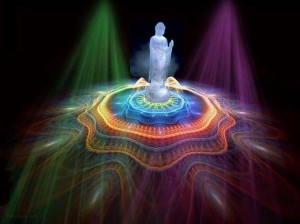Seth on the similarities between Christianity & Buddhism
 “Now you may believe in the theories of Buddhism, for example, or of another Eastern philosophy. The differences between any of those systems of thought and Christianity may be so apparent that the similarities escape you. You may follow one of the schools of Buddhism in which great stress is laid upon the denial of the body, discipline of the flesh, and the avoidance of desire. These elements are quite characteristic of Christianity also, of course, but they may appear more palatable, exotic, or reasonable coming from a source foreign to your childhood education. So you may leap from one to the other, shouting emancipation and feeling yourself quite free of old limiting ideas.
“Now you may believe in the theories of Buddhism, for example, or of another Eastern philosophy. The differences between any of those systems of thought and Christianity may be so apparent that the similarities escape you. You may follow one of the schools of Buddhism in which great stress is laid upon the denial of the body, discipline of the flesh, and the avoidance of desire. These elements are quite characteristic of Christianity also, of course, but they may appear more palatable, exotic, or reasonable coming from a source foreign to your childhood education. So you may leap from one to the other, shouting emancipation and feeling yourself quite free of old limiting ideas.
Philosophies that teach denial of the flesh must ultimately end up preaching a denial of the self and building a contempt for it, because even though the soul is couched in muscle and bone it is meant to experience that reality, not to refute it.
All such dogmas use artificial guilt, and natural guilt is distorted to serve those ends. In whatever terms, the devotee is told that there is something wrong with earthly experience. You are, therefore, considered evil as a self in flesh by virtue of your very existence.
This alone will cause adverse experience, making you reject the very basis of your own framework of experience. You will consider the body as a thing, a fine vehicle but not in itself the natural living expression of your being in material form. Many such Eastern schools also stress — as do numerous spiritualistic schools — the importance of the “unconscious levels of the self,” and teach you to mistrust the conscious mind.
The concept of nirvana and the idea of heaven are two versions of the same picture, the former being one in which individuality is lost in the bliss of undifferentiated consciousness, and the latter one in which still-conscious individuals perform mindless adoration. Neither theory contains an understanding of the functions of the conscious mind, or the evolution of consciousness — or, for that matter, certain aspects of greater physics. No energy is ever lost. The expanding universe theory* applies to the mind as well as to the universe.
Other comments by Seth on this subject of Nirvana & Heaven:
The you that you consider yourself is never annihilated. Your consciousness is not snuffed out, nor is it swallowed, blissfully unaware of itself, in some nirvana.* You are as much a part of a nirvana now as you will ever be.
*In Buddhism, nirvana — a state of heavenly perfection — is achieved by the extinction of individual life and the soul’s absorption into the supreme spirit. In a recent ESP class session, however, Seth said: ‘There is nothing more deadly than nirvana. At least your Christian concepts give you some twilight hopes of a stifling and boring paradise, where your individuality can at least express itself, and nirvana extends no such comfort. Instead it offers you the annihilation of your personality, in a bliss that destroys the integrity of your being. Run from such bliss!”
